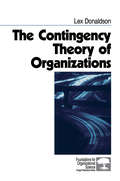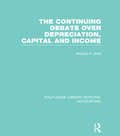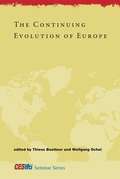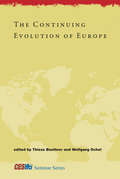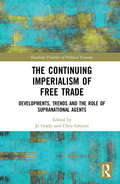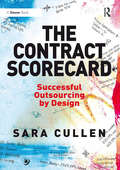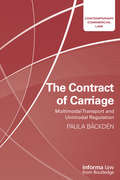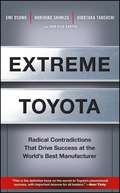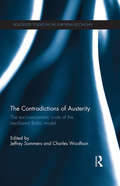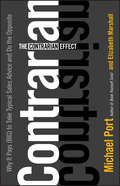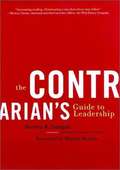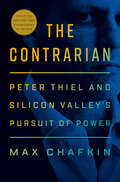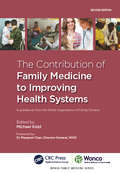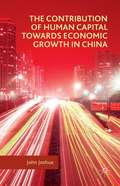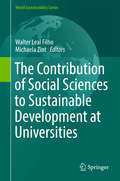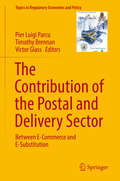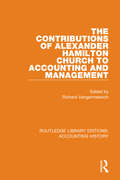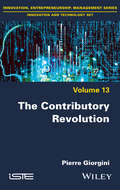- Table View
- List View
The Contingency Theory of Organizations (Foundations for Organizational Science)
by Professor Lex DonaldsonWritten by one of the foremost scholars in the field, this volume presents a comprehensive, in-depth analysis of the theories, evidence and methodological issues of contingency theory - one of the major theoretical lenses used to view organizations. It includes both an appreciation of the coherency of contingency theory overall and a frank recognition of some of the deficiencies in contingency theory research. The coherent underlying model provides the platform from which to make good some of the deficiencies through a series of improvements in theory and method that chart the course for future research.
The Continuing Debate Over Depreciation, Capital and Income (Routledge Library Editions: Accounting)
by Richard P. BriefBeginning with first principles, then discussing the origin and evolution of the debate over depreciation, capital and income, several related topics are addressed in this volume originally published in 1993. These include the allocation problem, interest rate approximations, issues concerning financial reporting and analysis and the meaning and economic impact of ‘accounting error’. The underlying themes concern the importance of history and the need for an appreciation of basic concepts and relationships in accounting
The Continuing Evolution of Europe
by Thiess Buettner Wolfgang OchelThe European Union began with efforts in the Cold War era to foster economic integration among a few Western European countries. Today's EU constitutes an upper tier of government that affects almost every level of policymaking in each of its twenty-seven member states. The recent financial and economic crises have tested this still-evolving institutional framework, and this book surveys key economic challenges faced by the EU. Prominent European economists examine such topics as the stability of the financial markets and possible policy options to reduce future vulnerability to crises, including Glass-Steagull-style narrow banking; the effect of emerging economies such as China and India on Europe's economic position; the protection of national interests in industrial policy; reforming and preserving the welfare state in the face of unemployment, population aging, and worker mobility within the EU; and improving the EU's institutional framework by reassigning responsibilities among supranational, national, and local governments. Among the conclusions that emerge from these analyses are the necessity for banking regulation as well as budgetary discipline; the need to consider global as well as European integration; and the idea that an environment that fosters internal competition will increase Europe's competitiveness internationally.
The Continuing Evolution of Europe (CESifo Seminar Series)
by Thiess Buettner Wolfgang OchelEconomists address key challenges facing the EU, including financial instability, welfare state reform, inadequate institutional framework, and global economic integration.The European Union began with efforts in the Cold War era to foster economic integration among a few Western European countries. Today's EU constitutes an upper tier of government that affects almost every level of policymaking in each of its twenty-seven member states. The recent financial and economic crises have tested this still-evolving institutional framework, and this book surveys key economic challenges faced by the EU.Prominent European economists examine such topics as the stability of the financial markets and possible policy options to reduce future vulnerability to crises, including Glass-Steagull-style narrow banking; the effect of emerging economies such as China and India on Europe's economic position; the protection of national interests in industrial policy; reforming and preserving the welfare state in the face of unemployment, population aging, and worker mobility within the EU; and improving the EU's institutional framework by reassigning responsibilities among supranational, national, and local governments.Among the conclusions that emerge from these analyses are the necessity for banking regulation as well as budgetary discipline; the need to consider global as well as European integration; and the idea that an environment that fosters internal competition will increase Europe's competitiveness internationally.
The Continuing Imperialism of Free Trade: Developments, Trends and the Role of Supranational Agents (Routledge Frontiers of Political Economy)
by Jo Grady Chris GrocottIn 1953, John Gallagher and Ronald Robinson shook the foundations of imperial history with their essay ‘The Imperialism of Free Trade’. They reshaped how historians saw the British empire, focussing not on the ‘red bits on the map’ and the wishes of policy makers in London, but rather on British economic and political influence globally. Expanding on this analysis, this volume provides an examination of imperialism which brings the reader right up to the present. This book offers an innovative assessment and analysis of the history and contemporary status of imperial control. It does so in four parts, examining the historical emergence and traditions of imperialism; the relationships between the periphery and the metropolitan; the role of supranational agencies in the extension of imperial control; and how these connect to financialisation and international political economy. The book provides a dynamic and unique perspective on imperialism by bringing together a range of contributors – both established and up-and-coming scholars, activists, and those from industry – from a wide range of disciplines and backgrounds. In providing these authors a space to apply their insights, this engaging volume sheds light on the practical implications of imperialism for the contemporary world. With a broad chronological and geographical sweep, this book provides theoretical and empirical engagements with the nature of imperialism and its effects upon societies. It will be of great interest to a broad range of disciplines across the humanities and social sciences, especially those working in History, Politics, and Management and Organisation Studies.
The Continuity and Discontinuity of the 250 Largest Enterprises in Germany: A History-Based Analysis of Family Influence, Corporate Development and Ownership Transactions (Familienunternehmen und KMU)
by Maximilian LantelmeThis book studies the long-term development of the 250 largest family and non-family enterprises in Germany between 1958 and 2018. In particular, the continuities and discontinuities of the companies’ ownership structure, operations and solvency are examined. Historical methods are used to advance the understanding of the attributed long-term orientation of family firms in family business research. The collected data of the 250 largest enterprises of 1958 provide the most comprehensive historical overview of the industrial landscape of this period. The long-term analyses show that more than half of the companies fail and less than a quarter keeps their ownership structure in the observation period of 60 years. In this timeframe, family-owned businesses have relatively stable ownership structures and superior survival rates compared to public companies although the latter experience higher growth rates. A listing of a family firm leads to the discontinuity of the family’s majority ownership in the mid- to long-term. Furthermore, company types like foundation-owned enterprises and foreign subsidiaries show even higher survival rates. The book closes with practical implications based on the identified development patterns of the surviving and failed enterprises.
The Continuum of Consumer Choice (Routledge Studies in Marketing)
by Gordon R. FoxallHuman consumption is multi- faceted and so requires inter- disciplinary exploration in order to explain a spectrum of experiences that is at once particular and allpervading. Consumer choice is a microcosm of human activity which transcends the purview of the archetypal marketing or consumer psychology textbook. Its perspective is that of social science itself. This book understands the study of consumer choice as a paradigm of human socio- economic activity and seeks further understanding of its socio- economic and philosophical bases.The Continuum of Consumer Choice provides a novel view of consumer choice based on the temporal horizon of the consumer, giving rise to a spectrum of consumption styles from the everyday to the extreme. The focus is on explaining this continuum in behavioral, cognitive, and neurophysiological terms, affording the reader a unique perspective on the intellectual basis of consumer psychology and marketing. The reader gains insight into a critical combination of economic psychology, neurophysiology, and philosophy, which contributes to establishing marketing and consumer research as scholarly academic pursuits. The book’s particular focus is the proper place and form of an intentional (cognitive and perceptual) explanation of consumer choice.This is an essential monograph for advanced students in consumer psychology and marketing as well as for researchers in these areas. It is particularly relevant to marketing and consumer theory, providing appreciation of their scholarly foundations. It also appeals to students, lecturers, and researchers in social science generally who are alert to the intellectual potential of consumer psychology and marketing as contributors to a full understanding of human behavior and experience.
The Contract Scorecard: Successful Outsourcing by Design
by Sara CullenAdoption and use of a contract scorecard demonstrates a maturing ability to manage commercial outsourcing arrangements. The process of designing the scorecard helps you nail down the key outcomes and avoid lack of focus, inconsistent objectives, hidden costs, indifferent service and deteriorating relationships with your contract partners. Sara Cullen's The Contract Scorecard will help you design and drive successful contracts. It offers a systematic guide based on practical advice and examples; one that explains the Contract Scorecard concept and demonstrates crucial implementation activities such as: ¢ The development of performance measures that work ¢ Sound Service Level Agreements that make obligations clear ¢ A Governance Charter that ensures both parties will adopt successful management techniques An upfront investment in your contracts, from a commercial rather than legal perspective is probably the single most influential activity you can undertake; one that will ensure your outsourcing relationships have clear business goals as the focus of the deal. Reading a copy of Sara Cullen's The Contract Scorecard should be the first step in that investment.
The Contract of Carriage: Multimodal Transport and Unimodal Regulation (Contemporary Commercial Law)
by Paula BäckdénThe Contract of Carriage: Multimodal Transport and Unimodal Regulation provides a new perspective on how to approach the question of multimodal transport regulation regarding liability for goods carried. Unlike previous literature, which has approached the issue of applicability from a strict interpretation-of-the-convention angle, this book will analyse the issue from a law of contracts perspective. If goods are damaged during international transport, the carrier’s liability is governed by rules laid down in international conventions, such as the CMR convention, the Hague–Visby Rules and the Montreal Convention. Such rules apply to certain modes of transport, to contracts for unimodal carriage. When goods are carried under a multimodal contract of carriage, which provides for carriage by more than one mode of transport, the question is whether these rules are applicable to transport under multimodal contracts of carriage. This book investigates the rules of carrier’s liability applicable to unimodal transport, and whether these rules are applicable to carriage under multimodal contracts of carriage, with focus on the actual contract of carriage. This unique text will be of great interest to students, academics, industry professionals, and legal practitioners alike.
The Contradictions That Drive Toyota’s Success
by Hirotaka Takeuchi Emi Osono Norihiko ShimizuFeature
The Contradictions of Austerity: The Socio-Economic Costs of the Neoliberal Baltic Model (Routledge Studies in the European Economy)
by Jeffrey Sommers Charles WoolfsonThe great financial crisis of 2008 and the ensuing global economic and financial turmoil have launched a search for "models" for recovery. The advocates of austerity present the Baltic States as countries that through discipline and sacrifice showed the way out of crisis. They have proposed the "Baltic model" of radical public sector cuts, wage reductions, labor market reforms and reductions in living standards for other troubled Eurozone countries to emulate. Yet, the reality of the Baltic "austerity fix" has been neither fully accepted by its peoples, nor is it fully a success. This book explains why and what are the real social and economic costs of the Baltic austerity model. We examine each of the Baltic States by connecting national level studies within a European and global political economy, thereby delivering comparative breadth that supersedes localized understandings of the crisis. Thus for each of the three Baltic states, individual chapters explore the different economic and social dimensions of neo-liberal post-communism and the subsequent wider global economic and financial crisis in which these newly financialized economies have found themselves especially vulnerable. The "austerity model" adopted by Baltic national governments in response to the crisis reveals the profound vulnerabilities created by their unwavering commitment to liberalized economies, not least in terms of the significant "exit" of their labor forces and consequent population loss. This book looks beyond basic financial metrics claiming a success story for the Baltic austerity model to reveal the damaging economic and social consequences, first of neo-liberal policies adopted during transition, and latterly of austerity measures based on "internal devaluation." Combined these policies undermine the possibility of longer-term recovery and even social and economic sustainability, not to mention prospects for successful integration in the now-faltering European project that has departed from its "Social Model" roots.
The Contradictions of Foreign Aid
by Desmond McNeillOriginally published in 1981, this book analyses how development aid works in practice. It presents a critique of the practice of foreign aid, analyses the aid process, who controls it and investigates the exercise of leverage by donors. It examines the interests of the different parties involved, identifies problems and suggests alternatives which may allow the aid process to operate more effectively in the interest of those who need it.
The Contrarian Effect
by Elizabeth Marshall Michael PortTake the traditional sales model, which is outdated and needs a serious makeover, and turn it on its head by applying the advice in The Contrarian Effect: Why It Pays (Big) to Take Typical Sales Advice and Do the Opposite. Find an entirely sound approach to building better client relationships and closing more sales by doing the exact opposite that conventional sales advice dictates. Re-examine the most well-worn sales tactics in the business and discover specific and actionable strategies and principles that will help you close more sales today.
The Contrarian's Guide to Leadership
by Steven B. SampleSample, president of the University of Southern California, challenges conventional teachings on leadership and urges leaders to look at some key counter-intuitive truths. He demonstrates the wisdom of putting off decisions, compromising on principles, and considering outrageous solutions. Annotation (c)2003 Book News, Inc., Portland, OR (booknews.com)
The Contrarian: Peter Thiel and Silicon Valley's Pursuit of Power
by Max ChafkinA biography of venture capitalist and entrepreneur Peter Thiel, the enigmatic, controversial, and hugely influential power broker who sits at the dynamic intersection of tech, business, and politics &“Max Chafkin&’s The Contrarian is much more than a consistently shocking biography of Peter Thiel, the most important investor in tech and a key supporter of the Donald Trump presidency. It&’s also a disturbing history of Silicon Valley that will make you reconsider the ideological foundations of America&’s relentless engine of creative destruction.&”—Brad Stone, author of The Everything Store and Amazon UnboundSince the days of the dot-com bubble in the late 1990s, no industry has made a greater impact on the world than Silicon Valley. And few individuals have done more to shape Silicon Valley than Peter Thiel. The billionaire venture capitalist and entrepreneur has been a behind-the-scenes operator influencing countless aspects of our contemporary way of life, from the technologies we use every day to the delicate power balance between Silicon Valley, Wall Street, and Washington. But despite his power and the ubiquity of his projects, no public figure is quite so mysterious.In the first major biography of Thiel, Max Chafkin traces the trajectory of the innovator's singular life and worldview, from his upbringing as the child of immigrant parents and years at Stanford as a burgeoning conservative thought leader to his founding of PayPal and Palantir, early investment in Facebook and SpaceX, and relationships with fellow tech titans Mark Zuckerberg, Elon Musk, and Eric Schmidt. The Contrarian illuminates the extent to which Thiel has sought to export his values to the corridors of power beyond Silicon Valley, including funding the lawsuit that destroyed the blog Gawker and strenuously backing far-right political candidates, notably Donald Trump for president in 2016. Eye-opening and deeply reported, The Contrarian is a revelatory biography of a one-of-a-kind leader and an incisive portrait of a tech industry whose explosive growth and power is both thrilling and fraught with controversy.
The Contrary Forces of Innovation
by Thomas HoholmThe complexity and tensions of industrial innovation processes are fleshed out through the analysis of an intriguing case study from the food industry. Drawing together insights from multiple disciplines, this book shows the controversial nature of innovation processes.
The Contribution of Family Medicine to Improving Health Systems: A Guidebook from the World Organization of Family Doctors (Wonca Family Medicine Ser.)
by Michael Kidd"This guidebook systematically analyses the contribution of family medicine to highquality primary health care in addressing the challenges faced by current health systems, and provides options for moving forward. It serves as a pragmatic guide to potential strategies for putting in place family care teams which effectively contribute to health sec
The Contribution of Human Capital towards Economic Growth in China
by John JoshuaThis book develops a human capital model to explain transformational growth within different stages of economic development, which will induce technological changes and consequently will require a change in human capital. China is a case study in transition and can provide useful lessons to other emerging economies.
The Contribution of Joseph A. Schumpeter to Economics: Economic Development And Institutional Change (Routledge Studies in the History of Economics)
by Richard Arena Cécile Dangel-HagnauerThis collection constitutes an examination of Schumpeter's legacy that is wider than any yet attempted. As one of the key economists of the twentieth century, Schumpeter's economics is viewed in the context of its relation to purer Austrian theories of the free market, Keynesian macroeconomics, the early neoclassicism of Marshall and Walras, and a persuasive argument made for its centrality to the discipline as a whole.
The Contribution of Social Sciences to Sustainable Development at Universities
by Walter Leal Filho Michaela ZintThis volume is the first of its kind to presentcontemporary, state-of-the-art examples of how social science theories, models,and findings can advance all aspects of campus sustainability, an area that hasso far been largely neglected. The individual chapters reflect the broaddiversity of research on sustainable campus development conducted within andacross basic and applied social science disciplines, drawing on a range ofmethods and case studies from around the world. Institutions of higher educationhave been among the leading promoters of sustainable development. However,efforts to transition to sustainability have been largely dominated bytechnological "solutions" and universities and colleges are increasinglyrecognizing that this transition cannot be achieved without attention to thehuman dimension. Administrators, campus sustainability officers and otheruniversity staff, faculty members and students, as well as alumni and externalconstituents all help to shape which sustainability innovations and initiativesare considered and pursued, and their participation determines the ultimatesuccess of sustainability efforts. The book's individual contributionsillustrate how the social sciences can broaden visions of what may be possible,identify the advantages and disadvantages of different instrumental andemancipator approaches, evaluate interventions' effectiveness, and offerprocesses for learning from mistakes and successes in ways that supportcontinuous advances toward sustainability. Given that the majority of socialscience research stems from universities, the level of trust in theseinstitutions, and their mission to develop societal leaders, higher educationinstitutions are ideally suited for testing, assessing and modeling the socialinnovations needed to achieve sustainability on campuses and beyond.
The Contribution of the Postal and Delivery Sector: Between E-commerce And E-substitution (Topics In Regulatory Economics and Policy Ser.)
by Timothy Brennan Pier Luigi Parcu Victor GlassThis book addresses major issues facing postal and delivery services throughout the world. Worldwide, there is currently a considerable amount of interest in postal and delivery economics. The industry is in a state of near crisis and drastic change is needed. The European Commission and member States are still wrestling with the problem of how to implement entry liberalization into postal markets, how to address digital competition, and how to maintain the universal service obligation (USO). The Postal Accountability and Enhancement Act of 2006 in the U.S. has perhaps created and exacerbated the problems faced by USPS. Post Offices (POs) have been slow to address the threat of electronic competition. On the other hand, e-commerce presents opportunities for POs to expand their presence in parcel delivery and perhaps help finance or redefine the USO. A major aim of this book is to address strategies POs can use to reinvent themselves for the digital age.This book compiles original essays by prominent researchers in the field, which will be selected and edited from papers presented at the 25th Conference on Postal and Delivery Economics held in Barcelona, Spain, May 24-27, 2017. That conference, and this volume, commemorates the memory of Michael Crew who organized twenty-four prior conferences and co-edited previous conference volumes. This book is a useful tool not only for graduate students and professors, but also for postal administrations, consulting firms, and Federal Government departments.
The Contributions of Alexander Hamilton Church to Accounting and Management (Routledge Library Editions: Accounting History #14)
by Richard VangermeerschThis book, first published in 1986, includes primarily articles written by Church not reprinted in his books. The collection demonstrates the breadth of his work and demonstrate why he was such a renowned expert in the fields of cost accounting and management. He introduced the ‘machine-hour rate’ method, the production-centre concept, the ‘regulative principles of management’ and distribution cost-analysis. His writings spanned the fields of accounting, business, management and industrial engineering, and this book captures the essence of his work and central themes.
The Contributions of John Maynard Keynes to Foreign Trade Theory and Policy, 1909-1946 (Routledge Library Editions: International Trade Policy #7)
by Joseph R. CammarosanoOver the course of his life, Keynes often abandoned ideas previously developed and at times assumed positions which were contradictory to his earlier thought. This inconsistency, it is charged, is especially true of his thinking in the field of international economics where he alternated between fee trade and protection. This book, first published in 1987, examines in detail the positions that Keynes adopted in the years 1909-1946.
The Contributory Revolution
by Pierre GiorginiThis book sheds light on a crucial debate on the possible role of the technosciences in meeting the challenges of the future. It shows that the current contributory revolution is global and profound, and that it concerns the whole epistemological field - from the sciences to social organizations. By delving into the epistemological dimension of the lightning transition we are currently experiencing, The Contributory Revolution identifies the levers of the salutary acceleration of collective learning, now essential, but not before the debate on a possible future has been settled via the headlong rush of the technoscientist.However, after this call to move from exo-distributive technoscience, carried by deterministic and Newtonian models, to more biological and endocontributory models - or even from the arrogance of mastery to the humility of influence and alliance - it will be necessary to set its limits to avoid entering into an eco-philosophical radicalism. Only extreme humility, carried by strong spirituality, can protect us from it.
The Control Revolution: Technological and Economic Origins of the Information Society
by James R. BenigerWhy do we find ourselves living in an Information Society? How did the collection, processing, and communication of information come to play an increasingly important role in advanced industrial countries relative to the roles of matter and energy? And why is this change recent―or is it? <P><P>James Beniger traces the origin of the Information Society to major economic and business crises of the past century. In the United States, applications of steam power in the early 1800s brought a dramatic rise in the speed, volume, and complexity of industrial processes, making them difficult to control. Scores of problems arose: fatal train wrecks, misplacement of freight cars for months at a time, loss of shipments, inability to maintain high rates of inventory turnover. Inevitably the Industrial Revolution, with its ballooning use of energy to drive material processes, required a corresponding growth in the exploitation of information: the Control Revolution. <P><P>Between the 1840s and the 1920s came most of the important information-processing and communication technologies still in use today: telegraphy, modern bureaucracy, rotary power printing, the postage stamp, paper money, typewriter, telephone, punch-card processing, motion pictures, radio, and television. Beniger shows that more recent developments in microprocessors, computers, and telecommunications are only a smooth continuation of this Control Revolution. Along the way he touches on many fascinating topics: why breakfast was invented, how trademarks came to be worth more than the companies that own them, why some employees wear uniforms, and whether time zones will always be necessary. <P><P>The book is impressive not only for the breadth of its scholarship but also for the subtlety and force of its argument. It will be welcomed by sociologists, economists, historians of science and technology, and all curious in general.
